|
May 7, 2020 - No. 32
Workers at Cargill Defend Their Rights
Opening of Cargill's High River Plant
Honouring Bui Thi Hiep

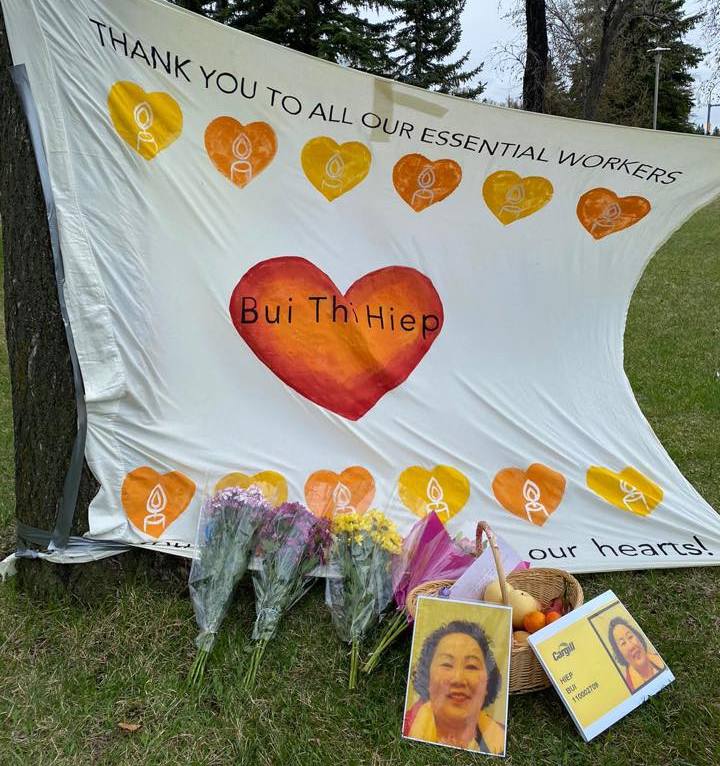 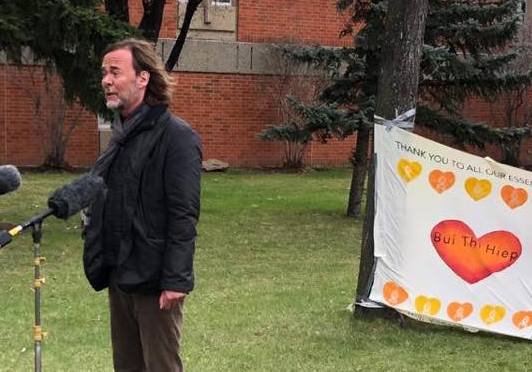
Fellow workers, friends and
family honour Cargill worker
Bui Thi Hiep with ceremony and
online vigil, May 4, 2020.
Hiep died of COVID-19 on April
20.
|
|
• Alberta
Labour Relations Board Refuses to Act to
Uphold the Rights of Workers - Peggy
Morton
British
Columbia
• Transit Workers
Oppose Cuts to Service - Brian
Sproule and Barbara Biley
Workers at Cargill Defend Their
Rights
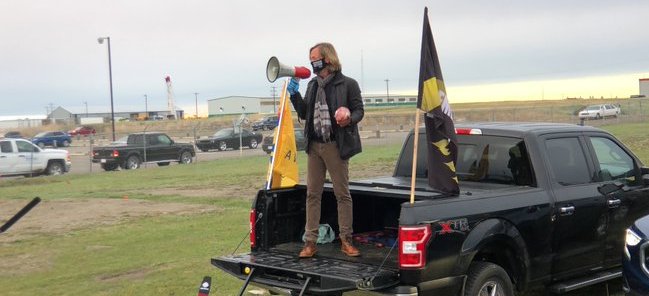
UFCW Local 401 President Thomas Hesse speaks
outside the Cargill plant, May 4, 2020,
denounces the company's decision to re-open the
plant. The union had tried unsuccessfully to
have the Alberta government prevent the plant
from re-opening.
The giant U.S. owned monopoly Cargill reopened
its High River plant on May 4 in violation of
the clear stand of the workers and their union
that the plant should not re-open until they
were satisfied that it was safe. As of May 4,
981 workers out of 2,000 had tested positive for
COVID-19, and the workers point out that many
workers who were sick have never been tested.
 UFCW Local 401
President Thomas Hesse said that Cargill is on
probation. The union advised workers that if
they are healthy and have been called and
medically cleared to return to work, they should
report to their supervisor. However, Hesse
emphasized again, if the workers find the plant
to be unsafe, they have the right to refuse
unsafe work. "If you don't really think it is
safe to work, then don't," he said. He also
advised the workers to immediately contact the
union if they felt the company was not keeping
them safe. UFCW Local 401
President Thomas Hesse said that Cargill is on
probation. The union advised workers that if
they are healthy and have been called and
medically cleared to return to work, they should
report to their supervisor. However, Hesse
emphasized again, if the workers find the plant
to be unsafe, they have the right to refuse
unsafe work. "If you don't really think it is
safe to work, then don't," he said. He also
advised the workers to immediately contact the
union if they felt the company was not keeping
them safe.
"Governments may disappoint us in their failure
to put ordinary, working people first, but being
part of a union is the best way to be able to
push back and not be silenced. As your union, we
will never let you be invisible. We will never
let you be without a voice. Never!" Hesse said.
"THE SITUATION AT CARGILL IS SERIOUS, AND THE
NUMBERS DON'T LIE. COVID-19 is deadly. It has
killed a Cargill worker and made people
desperately ill. It is reported that 921 [now 981 -- WF Ed.]
of the roughly 2,000 people who work at the
Cargill High River plant have now tested
positive for COVID-19. There are over 1,500
positive cases now linked to the plant. No one
should be surprised that we have looked for the
plant to close until it is clearly safe. There
are few who disagree with us."
Alberta's two major beef processing plants are
the site of Canada's largest two COVID-19
outbreaks — the first at Cargill and the second
at the JBS beef-processing plant in
Brooks. On May 5, it was announced that a
third plant in Alberta, Harmony Beef, located in
Balzac just north of Calgary, has 34 cases of
COVID-19. The Agricultural Union which
represents the meat inspectors at the plant has
called for the plant to be closed. The plant
itself is non-union.

The Alberta Labour Relations Board refused to
hold an emergency meeting and to act on the
union's demand that the plant remain closed
until the union could determine that it was safe
for the workers to return. Alberta
Occupational Health and Safety also refused to
take immediate action needed and issue a stop
work order to safeguard the health and very
lives of the workers. The Labour Board hearing
will begin on May 7, three days after the plant
reopened.
"There will be a reckoning at Cargill," UFCW
Local 401 President, Thomas Hesse, said on May
6. "In a matter of months, our members at
Cargill will be in a legal strike position, and
the anxiety and fear they are feeling now will
need to be addressed. Fear becomes anger. All
eyes are on their employer, and Cargill is on
probation."
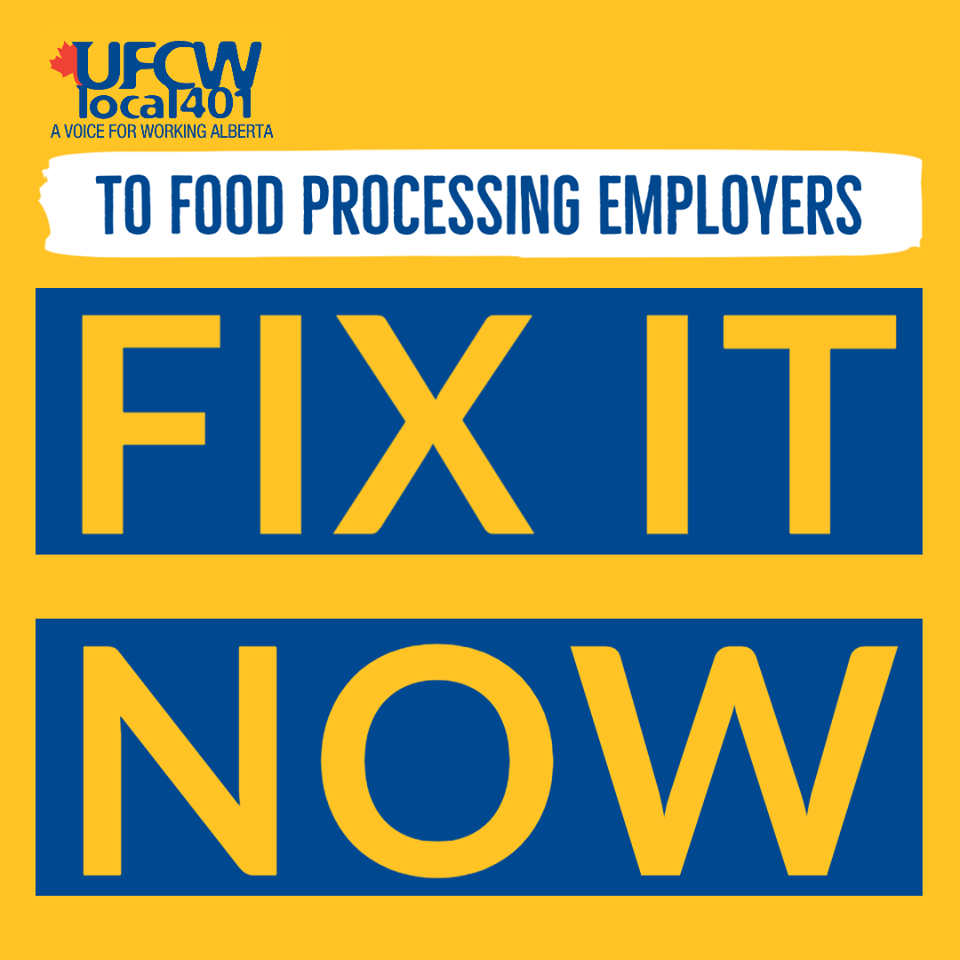 On May 4 the
harvest department or kill floor was opened and
the fabrication department where meat is
processed opened May 6. Representatives of
United Food and Commercial Workers Local 401
have been at the plant gates every day to
provide information to workers who came to work
and to provide workers with masks, and other
unions have joined them, to show their
support. On May 4 about 60 to 70 workers came to
work. There are 2,000 workers at the plant.
Three school buses retrofitted with seat
partitions to bring workers who normally carpool
to work arrived. One was empty except for the
driver, and another carried one person. Local
401 President Tom Hesse told the CBC that
Cargill is barely running on one wheel, not four
as they suggest, and that while a cow would
normally be disassembled in 40 minutes, it
actually took one hour and forty minutes. On May 4 the
harvest department or kill floor was opened and
the fabrication department where meat is
processed opened May 6. Representatives of
United Food and Commercial Workers Local 401
have been at the plant gates every day to
provide information to workers who came to work
and to provide workers with masks, and other
unions have joined them, to show their
support. On May 4 about 60 to 70 workers came to
work. There are 2,000 workers at the plant.
Three school buses retrofitted with seat
partitions to bring workers who normally carpool
to work arrived. One was empty except for the
driver, and another carried one person. Local
401 President Tom Hesse told the CBC that
Cargill is barely running on one wheel, not four
as they suggest, and that while a cow would
normally be disassembled in 40 minutes, it
actually took one hour and forty minutes.
Hesse stressed that it is the workers who know
what is going on in the plant, and what has
happened there. However the Chief Medical
Officer of Health is not basing her decision
that the plant is safe on the evidence of the
workers, but on hearsay evidence, which is not a
valid foundation for drawing conclusions.
Workers have spoken out about how they were
cleared to work even though they had symptoms,
had positive COVID-19 test results, had not
completed the required isolation periods and had
recently travelled abroad.
Who do those in authority think they are
fooling when they repeat over and over that
Cargill has assured them that the plant is safe?
The workers are not reassured by Public Health
Officer Dr. Hinshaw or any other official, Hesse
pointed out. But no government or legal
authority has intervened to keep the plant shut
until the workers and their union are satisfied
that the plant is safe, he said.
Hesse pointed out that the union has tried to
work with Cargill to develop sensible procedures
and policies, but the company's culture is about
moving as many cattle through the plant as they
can. Cargill normally processes about 4,000 head
of cattle each day, about 40 per cent of
Canada's beef supply.
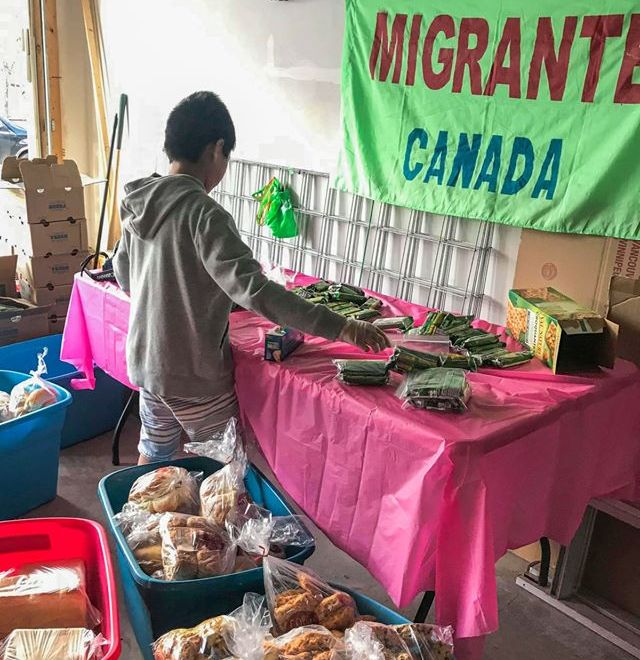
Migrante member sorting food for
temporary foreign workers at the also
hard hit JBS Foods plant in Brooks.
|
"Cargill is owned by the Cargill family. When
we communicate with them we communicate with
Wichita, Kansas. Cargill is a family owned
business. Fifteen of the family members are
billionaires, the fourth richest family, I am
told, in the United States, and you don't get
rich like that unless you know how to make money
and every cow that moves through that plant is
profit and so that motivation is a natural part
of business. But it is incumbent upon society
and policy makers and governments to ensure that
workplaces are safe, and profit does not just
drive what happens in society and this is
especially important at this time."
"We believe that this plant should close until
Cargill has proven that they care about worker
health and safety and that it matters more than
profits. Unfortunately, our pleas to the Alberta
government and Alberta Occupational Health and
Safety have fallen on deaf ears so far, Hesse
said. "We have not given up. We are continuing
to pressure Cargill in every possible way to
ensure your safety....
"Some positive things are happening. There has
been an outpouring of sympathy and support for
Alberta's food workers. So many groups are
working with us to be there for you. For
example, today, we delivered grocery gift cards
to Migrante, a group working hard to build
solidarity and deliver essential supplies to
those in need. Every Albertan and every Canadian
is now watching Cargill. The public wants to
know that you are safe when you eventually enter
that plant.
"Our hope is in each other. Workers themselves
can control their destiny by acting in
solidarity. As your union, we will be there to
support every choice you make."
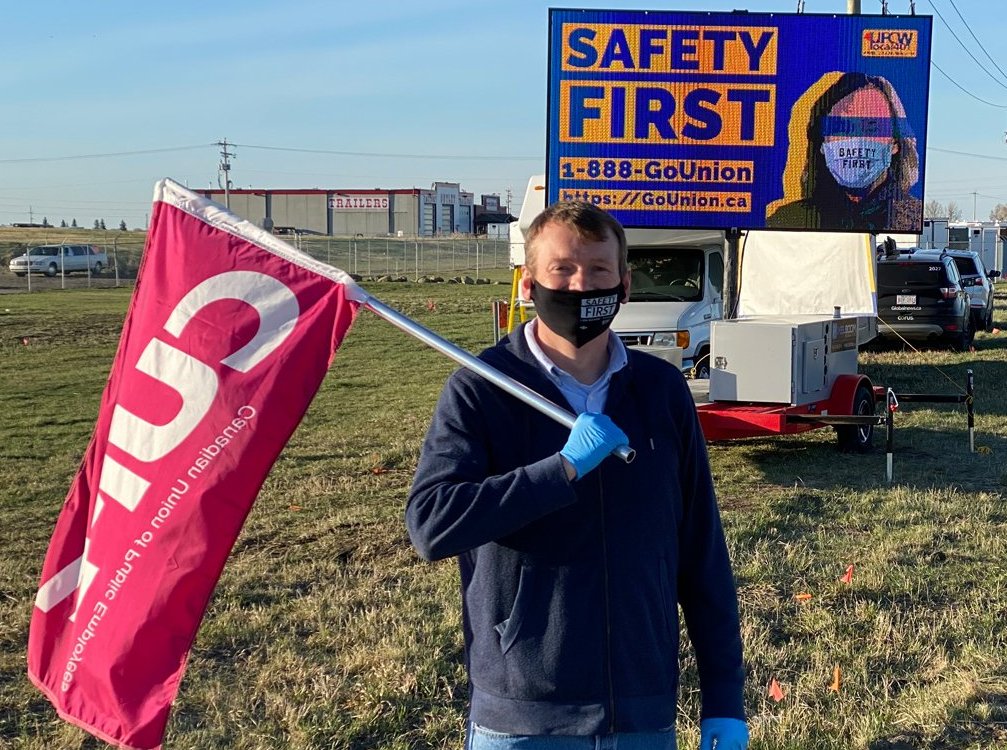 
Representatives of CUPE Alberta and Health
Sciences Association of Alberta join UFCW Local
401 members at the Cargill plant, May 5, 2020.

- Peggy Morton -
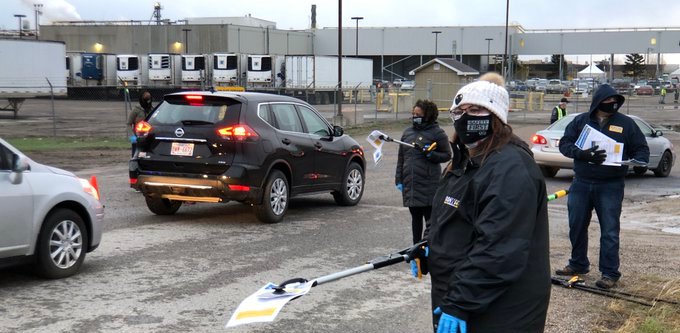
UFCW Local 401 greets workers going into the
Cargill High River plant as it reopens
May 4, 2020, with masks and information.
United Food and Commercial Workers Canada,
Local 401 filed an Unfair Labour Practice
complaint on April 29 arguing that Cargill had
violated two sections of Alberta's Labour Relations
Code by interfering with the
representation of the workers by the union, and
the workers' rights to representation.
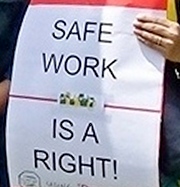 The Unfair Labour
Practice exposed that since the first cases of
COVID-19 were identified at the plant, Cargill
has consistently refused to recognize the union
as the workers' representative. It further
presented the workers with false and misleading
information about the union's involvement, in an
attempt to undermine confidence in the union and
wrongly suggest to workers that the union had
agreed to re-opening of the plant. The complaint
showed that on the contrary, Cargill management
had consistently refused to provide information
to the union, to provide answers to questions
and even to respond to the union regarding the
issues raised in the union's letter to Premier
Jason Kenney. The Unfair Labour
Practice exposed that since the first cases of
COVID-19 were identified at the plant, Cargill
has consistently refused to recognize the union
as the workers' representative. It further
presented the workers with false and misleading
information about the union's involvement, in an
attempt to undermine confidence in the union and
wrongly suggest to workers that the union had
agreed to re-opening of the plant. The complaint
showed that on the contrary, Cargill management
had consistently refused to provide information
to the union, to provide answers to questions
and even to respond to the union regarding the
issues raised in the union's letter to Premier
Jason Kenney.
The complaint provides information about how
Cargill has responded since the death of Bui Rhi
Hiep on April 20. At every step of the way it
has refused to carry out good faith negotiations
with the union and instead has used
disinformation, threats, bullying, and dictate.
For example, it took almost a week after
Hiep's death, and an order from
Occupational Health and Safety (OH&S),
before the company began an investigation into
her death as required by law. Alberta OH&S
finally toured the plant on April 27, but
conducted no interviews with the workers.
OH&S officials requested that Cargill
provide certain documents, but the company did
not comply. On April 28 Cargill held a virtual
town hall with the workers and did not ask the
union to participate. Cargill did not inform the
union that it would be re-opening the plant, nor
did it conduct any discussions with the union.
Despite this, Cargill sent a letter to every
worker stating that it was carrying on
discussions with the union about the plant
re-opening, leaving the impression that the
union was on board.
The union asked that the Alberta Labour
Relations Board (ALRB) hold an emergency hearing
and requested "interim relief," pointing to the
irreparable harm if workers were required to
return to work without their union being able to
determine if they could do so safely. The entire
country has heard the evidence of the workers as
to how the company pressured them to come to
work sick, refused to provide proper protection,
refused to slow the line to enable social
distancing, and showed utter disregard and
contempt for their health and very lives. That
Cargill management cannot be entrusted with the
safety of the workers who they consider things
and not human beings is evident to everyone, as
is the fact that it is the health and very lives
of workers, their families and communities that
are at stake. Everyone but those who in name
constitute the public authority, but who instead
act as Cargill's apologist and enabler.
It is difficult to imagine a situation more
fraught with the danger of irreparable harm,
with half of the workers already positive for
COVID-19, the death of a worker and close
contact, and others who are seriously ill in
hospital, some in intensive care. Despite the
clear urgency of the matter and where 85 per
cent of the workers had indicated that they felt
it was unsafe to work, the ALRB set the hearing
date for May 7, three days after the plant was
to reopen, and appointed a mediator to meet with
the parties over the weekend.
Local 401 asked for the matter to be
reconsidered. The Labour Board's decision
stated,
"The Union raises a natural justice concern,
saying the Decision effectively deprived it of
the ability to pursue interim relief. What I
take from the summary of the reasons provided is
that the Board was concerned about the
complexity of the litigation given the current
circumstances. The Union's complaint contained
detailed particulars and was only filed on
Friday. The Employer has yet to file its
response. The Decision reflects a balancing of
interests that is not unreasonable or unfair
during these extraordinary times."
In its decision, the Labour Board does not say
what is being balanced. It does not mention that
it is "balancing" the lives of human beings with
the greed and narrow interests of the foreign
billionaires who are intent on opening the
plant. The fact that the Employer has yet to
respond is even stated as having some relevance
-- an employer which has yet to even offer
condolences to the husband of Bui Thi Hiep, who
had worked for Cargill for 23 years and who died
of COVID on April 20.
Yes, much is revealed during extraordinary
times, first and foremost that the workers can
only count on themselves and on their own
organizing work and the strength of their
numbers and conviction to defend their rights
and that it is this fight which defends the
rights of all.
All Out to Support the Most
Vulnerable Workers at the Meatpacking Plants!
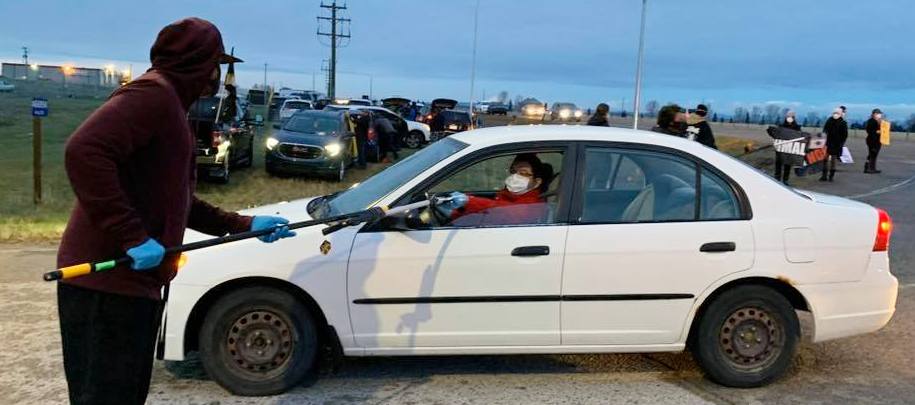
Cargill High River Plant, May 4, 2020

British Columbia
- Brian Sproule and Barbara
Biley -
Close to 1,000 transit operators and 200
maintenance staff, employees of Coastal Mountain
Bus Company (CMBC), received layoff notices on
April 20, effective May 18, 2020. The union
representing the workers issued a press release
on April 23 stating that it will challenge the
layoffs. The press release reports that "Unifor
will argue that CMBC breached the Labour
Relations Code by not giving 60 days notice. The
union will be seeking to have the lay-offs
rescinded, or at minimum pay workers during the
60 days."
News of the layoffs and further cuts to transit
services in BC's lower mainland, came without
notice. The recorded message on TransLink's
automated 24 hour "next bus" service simply
states "Due to low ridership, TransLink is
suspending some transit services."
TransLink is the body responsible for public
transit -- bus, SkyTrain (light rail trains),
West Coast Express rail service to the Fraser
Valley, and passenger ferries in Metro Vancouver
either through operating subsidiaries or private
contracts. Following service cuts made in March
TransLink recently announced huge cuts to its
operations effective April 24 with more service
cuts expected in May. Hundreds of transit
operators, mechanics, administrative staff and
other workers are being laid off "temporarily."
According to a Vancouver Sun article dated
April 20, transit ridership is down 80 per cent
since the COVID-19 outbreak and TransLink is
losing $70 million per month. Fare collection
has been suspended for the duration of the
pandemic and most buses have back door boarding
only, to support physical distancing and protect
drivers. TransLink CEO Kevin Desmond claimed
that TransLink "has no other options" and
according to TransLink there will be other
options for riders on "most" of these routes.
Further cuts are expected to be announced in
May. SkyTrain frequency has been reduced. SeaBus
passenger ferry service between Vancouver and
North Vancouver is operating at reduced levels
and late evening runs have been eliminated. West
Coast Express commuter rail service between
Vancouver and the Fraser Valley has been reduced
from five to three trains daily in each
direction.
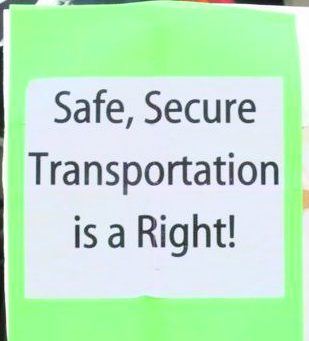 The transit
system cannot be treated as just a business.
Government has a social responsibility to
provide safe and adequate transit services for
workers, students, youth, seniors, and people
with disabilities. Ridership and revenue
statistics released by TransLink do not deal
with the needs and the real life experience of
the people and the society which depends on the
transit system to get workers to their jobs.
Social distancing regulations demanded by bus
operators and their union and implemented by
TransLink have resulted in buses running at less
than one third of capacity. Even without the
newly announced service cuts there are many
occasions on which passengers have been passed
by because of the reduced capacity of buses,
making essential service workers late for work.
In hospitals and long term care homes some
workers are forced to remain on the job after
the end of their shifts if those who are on the
next shift have not arrived because they are
stuck in transit. Longer commute times are a
huge problem for essential workers who are
unable to ensure that they pick up children in
time. Many people who have no other means of
transportation are late for scheduled medical
appointments. Others are required to carry
groceries farther as a result of closed bus
stops. These hardships are even greater for
seniors and people with mobility challenges. If
schools re-open, even partially, this will
result in even more pressure on the transit
system. The transit
system cannot be treated as just a business.
Government has a social responsibility to
provide safe and adequate transit services for
workers, students, youth, seniors, and people
with disabilities. Ridership and revenue
statistics released by TransLink do not deal
with the needs and the real life experience of
the people and the society which depends on the
transit system to get workers to their jobs.
Social distancing regulations demanded by bus
operators and their union and implemented by
TransLink have resulted in buses running at less
than one third of capacity. Even without the
newly announced service cuts there are many
occasions on which passengers have been passed
by because of the reduced capacity of buses,
making essential service workers late for work.
In hospitals and long term care homes some
workers are forced to remain on the job after
the end of their shifts if those who are on the
next shift have not arrived because they are
stuck in transit. Longer commute times are a
huge problem for essential workers who are
unable to ensure that they pick up children in
time. Many people who have no other means of
transportation are late for scheduled medical
appointments. Others are required to carry
groceries farther as a result of closed bus
stops. These hardships are even greater for
seniors and people with mobility challenges. If
schools re-open, even partially, this will
result in even more pressure on the transit
system.
Unions representing essential workers were
quick to condemn the cuts and layoffs. Jennifer
Whiteside, secretary-treasurer of the Hospital
Employees' Union (HEU) stated "These service
cuts mean added stress for health care and other
essential workers on the front line of BC's
pandemic response. Our members have limited
options to get to work and they've already been
facing lengthier commuting times as a result of
previously announced service reductions. We need
federal and provincial leaders to take emergency
measures to support public transit through this
pandemic slowdown. It's essential for those on
the front lines of this public health crisis."
An HEU press release on April 20 pointed out
that one in five health care workers depend on
public transit to get to and from work in
hospitals, care homes, community agencies, First
Nations' health centres, etc. Many work overtime
or take on second jobs in order to support their
families. The housing crisis has resulted in
longer commute distances for many workers.
Unifor western regional director Gavin
McGarrigle called the cuts "a reckless and
irresponsible move. Right now there are tens of
thousands of workers taking transit because they
have to be on transit. They are making sure that
people get the health care they need in long
term care homes and hospitals... and grocery
stores... the list goes on for essential
workers." David Black, president of Move Up, the
union representing administrative workers
employed by TransLink and its operating
subsidiary, Coast Mountain Bus Company, stated
that 160 union members were laid off with only
two days' notice instead of the required four
weeks' notice. He said that his union will
advocate for short term emergency funding for
public transit. BC premier John Horgan responded
by passing the buck to the federal government.
Horgan claims that the federal government has
"access to resources that can be deployed across
the country." So far there has been no
commitment from the federal government.
 While governments
shirk their social responsibility, front line
essential service workers are stepping up to the
plate, making sacrifices and putting their
health and lives at risk to serve others.
Transit workers and others are speaking in their
own names and demanding authorities provide
personal protective equipment and implement
life-saving sanitary measures in order that
services like transit that are essential to
society can continue to operate. This is the
activation of the human factor that is blocked
by the political system which marginalizes
workers and excludes them from decision-making.
With the awareness of their leading role in
solving the problems posed by the COVID-19
emergency, workers are also coming to realize
the need to organize for their empowerment. While governments
shirk their social responsibility, front line
essential service workers are stepping up to the
plate, making sacrifices and putting their
health and lives at risk to serve others.
Transit workers and others are speaking in their
own names and demanding authorities provide
personal protective equipment and implement
life-saving sanitary measures in order that
services like transit that are essential to
society can continue to operate. This is the
activation of the human factor that is blocked
by the political system which marginalizes
workers and excludes them from decision-making.
With the awareness of their leading role in
solving the problems posed by the COVID-19
emergency, workers are also coming to realize
the need to organize for their empowerment.

(To access articles
individually click on the black headline.)
PDF
PREVIOUS ISSUES
| HOME
Website: www.cpcml.ca
Email: office@cpcml.ca
|





 UFCW Local 401
President Thomas Hesse said that Cargill is on
probation. The union advised workers that if
they are healthy and have been called and
medically cleared to return to work, they should
report to their supervisor. However, Hesse
emphasized again, if the workers find the plant
to be unsafe, they have the right to refuse
unsafe work. "If you don't really think it is
safe to work, then don't," he said. He also
advised the workers to immediately contact the
union if they felt the company was not keeping
them safe.
UFCW Local 401
President Thomas Hesse said that Cargill is on
probation. The union advised workers that if
they are healthy and have been called and
medically cleared to return to work, they should
report to their supervisor. However, Hesse
emphasized again, if the workers find the plant
to be unsafe, they have the right to refuse
unsafe work. "If you don't really think it is
safe to work, then don't," he said. He also
advised the workers to immediately contact the
union if they felt the company was not keeping
them safe.
 On May 4 the
harvest department or kill floor was opened and
the fabrication department where meat is
processed opened May 6. Representatives of
United Food and Commercial Workers Local 401
have been at the plant gates every day to
provide information to workers who came to work
and to provide workers with masks, and other
unions have joined them, to show their
support. On May 4 about 60 to 70 workers came to
work. There are 2,000 workers at the plant.
Three school buses retrofitted with seat
partitions to bring workers who normally carpool
to work arrived. One was empty except for the
driver, and another carried one person. Local
401 President Tom Hesse told the CBC that
Cargill is barely running on one wheel, not four
as they suggest, and that while a cow would
normally be disassembled in 40 minutes, it
actually took one hour and forty minutes.
On May 4 the
harvest department or kill floor was opened and
the fabrication department where meat is
processed opened May 6. Representatives of
United Food and Commercial Workers Local 401
have been at the plant gates every day to
provide information to workers who came to work
and to provide workers with masks, and other
unions have joined them, to show their
support. On May 4 about 60 to 70 workers came to
work. There are 2,000 workers at the plant.
Three school buses retrofitted with seat
partitions to bring workers who normally carpool
to work arrived. One was empty except for the
driver, and another carried one person. Local
401 President Tom Hesse told the CBC that
Cargill is barely running on one wheel, not four
as they suggest, and that while a cow would
normally be disassembled in 40 minutes, it
actually took one hour and forty minutes. 




 The Unfair Labour
Practice exposed that since the first cases of
COVID-19 were identified at the plant, Cargill
has consistently refused to recognize the union
as the workers' representative. It further
presented the workers with false and misleading
information about the union's involvement, in an
attempt to undermine confidence in the union and
wrongly suggest to workers that the union had
agreed to re-opening of the plant. The complaint
showed that on the contrary, Cargill management
had consistently refused to provide information
to the union, to provide answers to questions
and even to respond to the union regarding the
issues raised in the union's letter to Premier
Jason Kenney.
The Unfair Labour
Practice exposed that since the first cases of
COVID-19 were identified at the plant, Cargill
has consistently refused to recognize the union
as the workers' representative. It further
presented the workers with false and misleading
information about the union's involvement, in an
attempt to undermine confidence in the union and
wrongly suggest to workers that the union had
agreed to re-opening of the plant. The complaint
showed that on the contrary, Cargill management
had consistently refused to provide information
to the union, to provide answers to questions
and even to respond to the union regarding the
issues raised in the union's letter to Premier
Jason Kenney.
 While governments
shirk their social responsibility, front line
essential service workers are stepping up to the
plate, making sacrifices and putting their
health and lives at risk to serve others.
Transit workers and others are speaking in their
own names and demanding authorities provide
personal protective equipment and implement
life-saving sanitary measures in order that
services like transit that are essential to
society can continue to operate. This is the
activation of the human factor that is blocked
by the political system which marginalizes
workers and excludes them from decision-making.
With the awareness of their leading role in
solving the problems posed by the COVID-19
emergency, workers are also coming to realize
the need to organize for their empowerment.
While governments
shirk their social responsibility, front line
essential service workers are stepping up to the
plate, making sacrifices and putting their
health and lives at risk to serve others.
Transit workers and others are speaking in their
own names and demanding authorities provide
personal protective equipment and implement
life-saving sanitary measures in order that
services like transit that are essential to
society can continue to operate. This is the
activation of the human factor that is blocked
by the political system which marginalizes
workers and excludes them from decision-making.
With the awareness of their leading role in
solving the problems posed by the COVID-19
emergency, workers are also coming to realize
the need to organize for their empowerment.